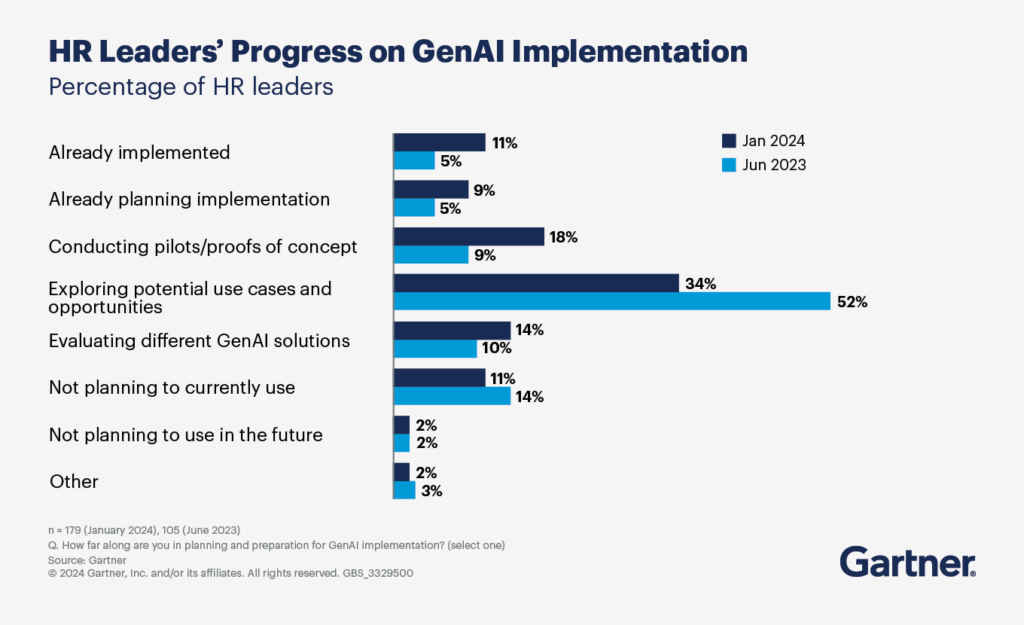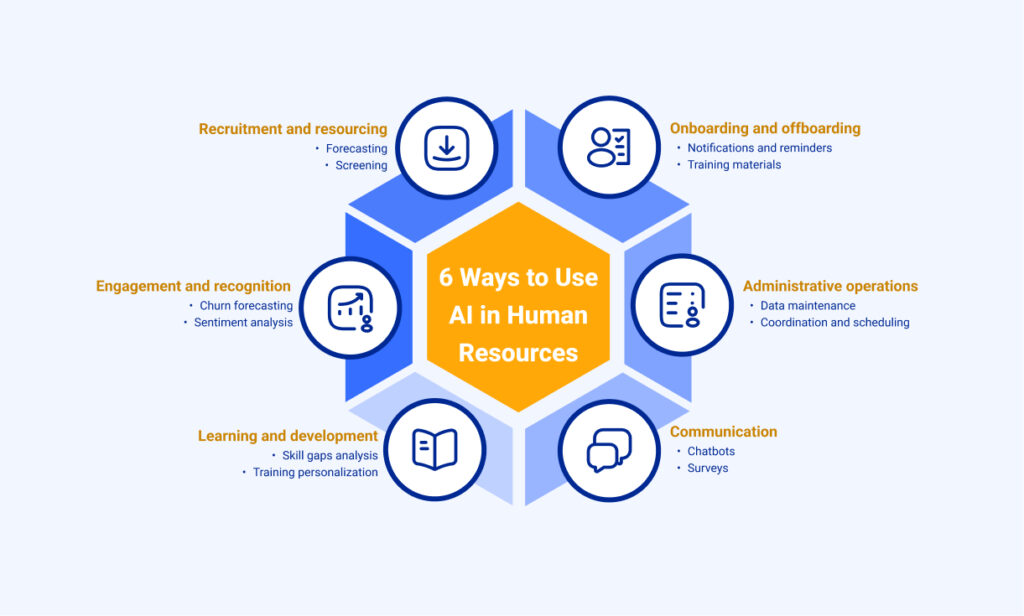Nowadays, AI is literally everywhere! Its ability to process vast amounts of data, make intelligent predictions, and automate repetitive tasks is reshaping all industries, including HR.
A survey by Gartner found out that from June 2023 to January 2024, the number of HR leaders conducting pilots and planning implementations of generative AI doubled.

AI-powered tools are revolutionizing the way organizations identify, attract, and hire top talent. From resume screening and candidate assessments to conducting interviews and onboarding, AI streamlines recruitment, onboarding, performance evaluation, and other processes, saving HR professionals time and resources.
In this article, we’ll look at the current landscape of AI in Human Resources, highlighting its opportunities and challenges, as well as the impact on HR professionals.
Navigating the Future of Human Resources
Walt Disney once said, “Times and conditions change so rapidly that we must keep our aim constantly focused on the future.”
The dynamic talent market requires developing competitive rewards and benefits packages, creating customized career journeys, and enhancing diversity, equity, and inclusion.
To meet these challenges head-on, the HR function of the future must undergo a fundamental transformation. HR professionals need to become strategic business partners who help organizations prepare for what’s next. This means not only understanding business objectives but also aligning talent strategies to support them.
The Pros and Cons of Using AI in HR
As you can see, the future value of HR will largely stem from deep data analytics and talent insights. On the other hand, integrating AI in HR processes raises valid concerns about privacy, ethics, and the future of work.
One of the most significant advantages of AI in HR is the potential for increased productivity. Studies have shown that AI can boost productivity by 20-40% for HR Business Partners (HRBPs) and recruiters.
Besides that, AI helps create better-structured processes, particularly in onboarding and offboarding. This leads to a more organized approach that enhances the overall employee experience.
Moreover, companies utilizing AI have seen a threefold increase in employee engagement due to better insights into workforce dynamics and preferences.
By automating candidate screening and other repetitive tasks, AI tools significantly decrease hiring costs. Reports indicate a 50% reduction in time to hire and a 90%+ boost in efficiency for some workflows.
Now, to the drawbacks. One of the primary concerns surrounding AI in HR is the risk of job displacement. As automation takes over routine tasks, there is a fear that certain HR roles may become redundant, leading to job losses and reduced job security for HR professionals.
However, experts believe it’s more a myth than a future reality. Dr. Dieter Veldsman, Chief HR Scientist at AIHR, explains: “AI could finally be the game-changer that allows the HR to reinvent our contribution. AI will change, replace, and create HR jobs. We should embrace the opportunity to reshape HR and not get caught in the fear of change.”
Another questionable moment is the over-reliance on AI tools that can lead to a diminished human touch in HR processes. While AI excels at data processing, it cannot replicate the empathy and understanding that human professionals bring to sensitive situations such as conflict resolution or employee support.
Then, the use of AI often involves handling large volumes of personal data, raising concerns about privacy as well as about biases in hiring or promotion decisions.
This could undermine security and diversity and inclusion efforts within organizations.
But still, AI is already here, and all we can do is try to make the most of it while maintaining the essential human element.
Let’s have a look at those who are already doing it.

Applications of AI in HR
The applications of AI in human resources and talent management are vast. The IDC’s Future of Work research revealed that 80% of global 2000 companies plan to use algorithmic managers for hiring, firing, and training workers by 2024.

In recruitment, AI helps automate and optimize various stages of talent acquisition.
Natural language processing (NLP) allows to assess candidates’ skills and
experiences more accurately than traditional methods; it can also match candidates with job descriptions and even predict their potential success within the organization.
Additionally, AI can facilitate skills assessments through automated testing platforms, providing HR teams with deeper insights into a candidate’s capabilities before they even enter the interview room.
For example, Attract AI utilizes advanced algorithms to sift through candidate data, including personal social media profiles, assessing various factors such as skills, experience, and cultural fit and predicting a candidate’s likelihood of success in a specific role.
When it comes to creating a smooth onboarding experience for new hires, AI enhances the process by providing personalized onboarding plans and resources tailored to each employee’s role and background.
AI-driven platforms also streamline administrative tasks such as document submission, training scheduling, and compliance checks.
Tools like Zavi automate key components of the onboarding journey, analyze the needs and backgrounds of new employees, and offer onboarding templates tailored to individual roles and departments.
Similarly, during offboarding, AI can help with exit interviews and gather feedback through automated surveys.
AI-driven learning and development platforms provide personalized training and development opportunities to employees based on their individual needs and skill gaps.
These platforms leverage AI algorithms to analyze performance data, assess learning styles, and curate customized learning paths. By offering targeted content and adaptive learning experiences, these tools enhance employee skills and contribute to their professional growth.
Betterbox, for example, provides tools for setting, tracking, and aligning individual and team goals with organizational objectives. It lets organizations shift from traditional annual performance reviews to a more dynamic, continuous performance management approach, leveraging real-time feedback and regular check-ins.
AI platforms designed to increase employee engagement and enhance performance management assist HR departments in understanding employee sentiment, providing feedback, and developing strategies to boost engagement.
These tools employ sentiment analysis, natural language processing, and machine learning algorithms to measure employee satisfaction, identify areas of improvement, and offer personalized recommendations for enhancing productivity and performance.
Platforms like inFeedo help to enhance employee engagement and retention by collecting data about the workforce’s sentiments and needs. Besides a robust suite of tools for conducting employee surveys that you can customize to gather specific feedback on various aspects of the employee experience, including job satisfaction, workplace culture, and management effectiveness, inFeedo uses powerful algorithms to predict employee attrition. By analyzing survey data and other metrics, the platform identifies patterns and potential risk factors that could lead to turnover, allowing organizations to address concerns before they escalate.
Furthermore, AI can assist in recognizing employee achievements through automated recognition programs that celebrate milestones and contributions, fostering a positive workplace culture.
Last but not least, AI significantly enhances administrative operations within HR by automating routine tasks such as data maintenance, notifications, reminders, coordination, and scheduling.
AI platforms focusing on predictive analytics and workforce planning enable HR departments to make data-driven decisions. These platforms analyze large volumes of HR data, including employee demographics, performance metrics, and market trends.
With the help of machine learning algorithms, these tools can forecast future workforce needs, identify retention risks, and optimize workforce allocation, ultimately helping organizations make proactive and strategic decisions.
AI-powered chatbots and virtual assistants are also becoming increasingly popular in HR departments. These conversational tools can handle routine HR inquiries, such as answering questions about policies, benefits, and leave requests.
And there’s a lot more! For example, Pictory can convert text-based content, such as company announcements, training materials, or employee handbooks, into visually appealing videos or extract key highlights from your Zoom, Teams, webinar, and podcast recordings and transform them into short, branded video snippets perfect for sharing on social media.
The Final Note
As we look ahead, the future of AI in HR is not just about technological advancements; it signifies a profound transformation within the profession itself.
The integration of AI into the employee lifecycle will require HR professionals to evolve, developing new skills and adapting to a rapidly changing landscape.
The role of HR will expand beyond traditional boundaries, necessitating a comprehensive understanding of how AI can enhance workforce management.
This shift will demand that HR professionals recognize the value these AI tools bring and strategically incorporate them into future workforce plans.


